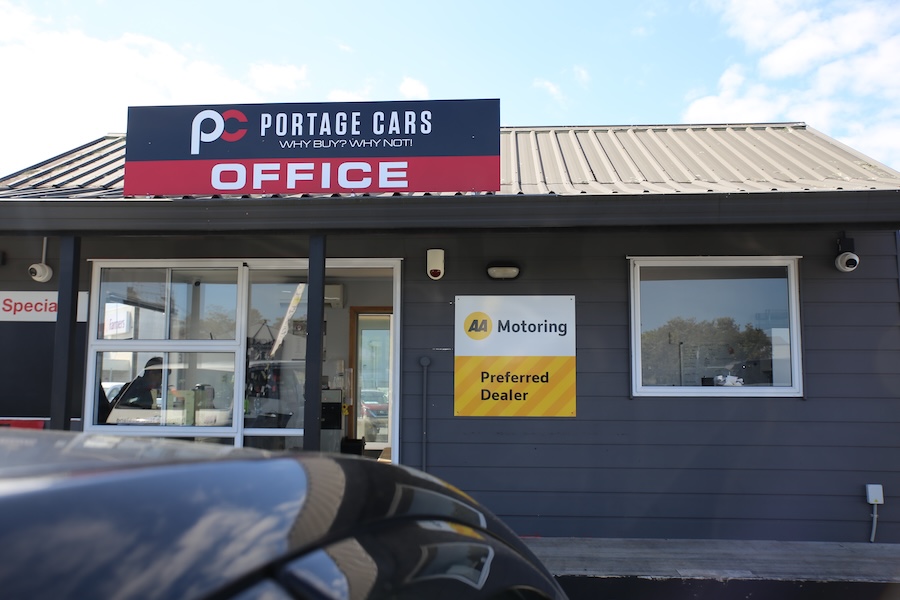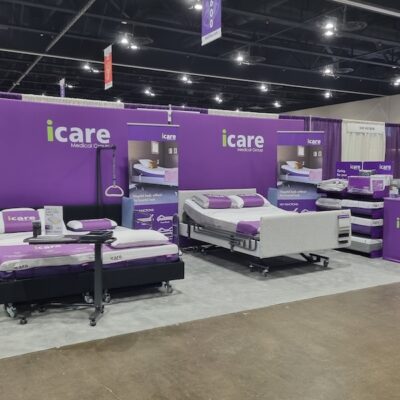Portage Cars: Shifting gears in New Zealand’s automotive market
Pictured above: Blaine Barratt (left) and Ken Quigley (right).
Portage Cars, a well-established dealership in New Zealand with seven locations across the country, is navigating the twists and turns of a rapidly changing automotive industry. With a strong commitment to customer service and vehicle quality, the dealership is embracing the rise of digital platforms and shifting customers preferences, all while maintaining the trust they’ve built with customers nationwide.
Since its acquisition in 2018 by Patrick Davey and Ken Quigley, Portage Cars has been driven by a commitment for going the extra mile to ensure customer satisfaction.
Ken, with 25 years of experience in logistics and extensive work with Japan and many other global markets, brings a wealth of knowledge to the business. Patrick with over 20 years’ experience in Japan buying vehicles and having his own vehicle export business has allowed Portage Cars to secure high-quality vehicles and meet the evolving needs of their customers.
Portage Cars has also earned the prestigious recognition of being the largest of only 26 dealer groups in New Zealand to partner with the AA and be named as an AA Preferred Dealer. This partnership has been important for building trust with customers, who know they are not only purchasing a quality vehicle but one that has been independently checked by one of the most trusted names in the NZ automotive industry.
“To be an AA Preferred Dealer means utilising the AA for our pre-delivery checks, including a compliance inspection, an odometer inspection and an AA appraisal – on top of the checkups done in Japan,” says General Manager, Blaine Barratt.
“We add to the assurances that these independent processes give by rewarding every customer with 12 months of AA Roadside Assistance at no extra charge”
The thorough AA compliance inspection that every car received includes stripping down components such as wheels and interior panels, followed by a mechanical check to ensure no hidden issues.
“On top of that, all cars also undergo a WOF check, NZTA inspection, and a final quality inspection by our operations team.”
Ken takes pride in this rigorous process.
“There are of people that bring a car in from Japan, they put it to compliance, wash it up, clean it, and then chuck it on the yard, right? We’ve gone well above and beyond on that process to make sure that we’re putting out a product that we’re happy selling.”
Managing market demands
Portage Cars carefully tracks customers trends across the country, responding to regional preferences with a tailored approach to stock.
In Auckland and Wellington, for example, hybrid vehicles like the Toyota Prius and Aqua are particularly popular due to their fuel efficiency and suitability for city driving.
“They are economical and good for the city traffic,” Ken says.
In contrast, utes are the top sellers in more rural areas where durability and practicality are key factors.
Their buying team closely monitors customer patterns and adjusts the dealership’s inventory accordingly.
“When considering what cars to bring in from Japan, we watch customers’ patterns closely,” Ken explains.
This allows Portage to ensure their available stock is the tight mix to meet current market demand.
This data driven approach allows Portage Cars to stay competitive in a fluctuating market, where consumer preferences can change quickly.
One of the biggest challenges Portage Cars currently faces is sourcing hybrid vehicles.
“Hybrids are some of the most popular cars at the moment,” Ken says.
However, high demand worldwide makes it difficult to secure these vehicles at auctions in Japan.
“The competition is through the roof when the auction happens in Japan. There are other markets all around the world chasing electric vehicles and hybrids, so they’ve become very, very expensive, and prices New Zealand out of that market.”
Electric vehicles (EVs), while gaining popularity, present additional hurdles.
Ken says that importing used EVs, such as the Nissan Leaf, is becoming less viable as they compete with brand new models like the BYD, an electric car brand made in China.
Despite some of these challenges, Portage Cars imports around 300 vehicles per month from Japan.

Adjusting to the digital sales
Like many industries, the automotive market has seen a significant shift towards digital platforms. Customers today have more options at their fingertips and can easily compare prices and models without leaving their homes. This has changed the car-buying process dramatically.
“You used to have localised pricing, and people would drive from Taupo to Auckland to get a cheaper car, but because of online platforms, everyone needs to stay competitive and price aggressively,” Blaine says.
The rise of online car listings has made it easier for consumers to find the best deal, reducing the need for long-distance travel and encouraging dealerships to maintain transparency.
The shift to digital marketing has also transformed how dealerships like Portage Cars engage with potential customers.
“Gone are the days of people opening the Auto Trader magazine, going to six different car yards, and showing what they’ve circled. Now, instead of spending a day, they can just jump online and take a look for half an hour,” Ken says.
This digital transformation has equipped Portage Cars with powerful tools for tracking stock and understanding customers preferences.
“This kind of insight helps dealerships make informed decisions on inventory management,” Ken says.
The dealership can now track what sells fastest and adjust stock accordingly, reducing guesswork and improving efficiency.
The impact of economic shifts
While digital trends and customers preferences play a significant role in shaping the car market, economic factors remain a key driver of consumer behaviour. Interest rates, in particular, heavily influence car sales, as customers often rely on financing to make their purchases.
“When interest rates go down, car sales go up,” Blaine says.
He says that during a recession, people hold back from paying big sums in one transaction, so as soon as the interest rates lower and weekly finance options become more affordable, car yards will see an influx of customers.
Ken is optimistic about the economic outlook for the business, noting the Reserve Bank’s recent decision to lower the official cash rate to 4.75 percent in October 2024.
“Even though the Reserve Bank has dropped the official cash rate, people who pay a mortgage will see the benefit of it around March 2025,” Ken explains.
He adds that while New Zealand’s economy has faced challenges, he is hopeful about the future.
“We killed our economy, but comparing to the US, UK and Australia, we may recover quicker.”
Economic downturns also lead to noticeable shifts in customers behaviour.
A trend that comes off the back of an economy challenged is people downsizing their cars.
“People are selling their $50,000 car and buying a $25,000 car,” Ken says.
This trend reflects the broader impact of economic uncertainty, with customers looking to reduce costs associated with petrol, maintenance, and insurance.
Portage Cars has responded to this trend by being open to trade-ins and adjusting its inventory to include more affordable, economical options, and works with some of NZ’s most respected lenders to bring a range of vehicle financing options to their customers
Despite the challenges posed by both global competition and economic uncertainty, Ken remains optimistic about the short-term future.
“The general feel is that there’s a lot more optimism in the marketplace, but there’s certainly a long way to go towards where the heydays were,” Ken says.





